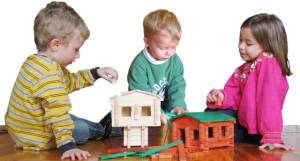
By Rabbi Ari Enkin, rabbinic director, United with Israel
As promised in our previous installment, I am pleased to share with parents some tips to prevent and solve sibling rivalry. This advice should also help in general with discipline in the household.
For starters, honor and respect your spouse! Otherwise, you cannot expect your children to honor or get along with one another. A healthy marriage leads to a healthy family unit.
Now that I got that out of the way….
Parents must be in agreement and show a united front on the boundaries and penalties when there is sibling rivalry. There are certain things that cannot go unaddressed, such as lying, hitting, biting and name-calling. These should be considered over the “Red Line” (not to be confused with the meaningless “Green Line” in Israel!) and unacceptable under any circumstances.
Train your children to ask for forgiveness when they get into fights or offend someone. They should also learn how to grant forgiveness when someone comes asking for it. As your children move into their teenage years, you will need a mutually agreed-upon game plan for dealing with these issues and punishing accordingly.
Validate their Feelings
It is very worthwhile for parents to validate their children’s feelings regarding the difficulties in living and getting along with others, even when they are our own family members. Validating a child’s feelings helps him or her to think clearly. It also helps the child to see the problem from the sibling’s perspective, and by extension, it helps parents better grasp both sides of the story. It keeps us parents calm and helps us discipline without yelling and accusing. Teaching that disagreements are an expected element in family life helps the sensitive child to feel better about his feelings – he is normal, not mean.
Give your children options and alternatives. Try something like: “Either work this out or you’ll both be given some extra chores this week!” There’s nothing quite like a good, healthy chore to help children get hold of their emotions and find a way to settle a disagreement. Make a list of extra “nasty” chores … washing windows, cleaning bathtubs and bathrooms, mopping the kitchen, etc.
Conflict Provides Opportunity
Nevertheless, do not expect your children to be conflict-free. They are different, and they will disagree and compete with one another. Competition, disagreement, conflict and division have been around since the beginning of time. Remember: Conflict provides training and teaching opportunities.

Learning to share toys is not always simple. Conflict is inevitable. (Photo: roytoy.com)
Very important: When appropriate, let natural consequences occur. Moms, this may be especially suited for you. Sometimes you have to put motherly emotions aside and let the children argue for awhile. Don’t always rush in to rescue your children from conflict. Sometimes children are just using conflict to get your attention. In such situations, just letting them argue and work things out is the best thing. You’ll wear yourself out quickly if you are constantly refereeing! We have to help kids resolve conflicts. Try suggesting that the kids think of solutions on how to get along. For example, we can say things like:
“I see you guys are having trouble sharing that toy. Do you have any ideas that might work?”
“What do you guys suggest can be done to fix this problem?”
“Have you guys decided who’s going to take out the garbage and who’s going to clean the playroom?”
We also need to remember that parenting is a slow process. You are setting the stage for how they will handle conflict later on in life. They might not come up with solutions all the time, but you are certainly building a problem-solving mindset.
Beware: Labels Become Identity
When we see children misbehaving, we tend to point it out to them. We might say, “You’re acting like a show off!” Keep in mind, however, that the other children may not have picked up on the annoying behavior. But now that you’ve mentioned it, they certainly will. In fact, at this point the whole family might jump on the bandwagon and start calling the child a “show off.” Everyone will start to view this child in a negative way. What happens? The child also begins to think of himself in that way. Children often become the labels that they are called.

(Photo: http://sites.udel.edu)
A child thinks, “If my parents and siblings think I’m a show off, then it must be true.” It becomes a part of their self-image. This adds fuel to the fire of teasing, fighting and bickering between siblings. Parents need to avoid using negative labels to describe their children. To change a child’s behavior, we need to focus on their positive actions – what they’re doing right instead of what they’re doing wrong.
Very often, short mottoes and catchphrases can go a long way in keeping the peace and teaching children the importance of getting along. And you know what? Kids appreciate these sayings because they allow the parent to get the point across without a long, drawn-out lecture. So when our kids are fighting or otherwise misbehaving towards one another, we can simply but firmly say, for instance:
“Our family strives to support each other.”
“Teasing hurts feelings.”
“Hands to yourselves!”
“You have the ability to be kind, use it!”
I hope that some of what we’ve discussed here will help you to be a better parent. But most important – don’t forget to PRAY. Prayer is always a great way to get some assistance in your God-given, sacred task of parenting.
For Part 1 on this topic, click HERE.


